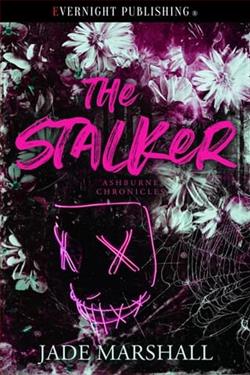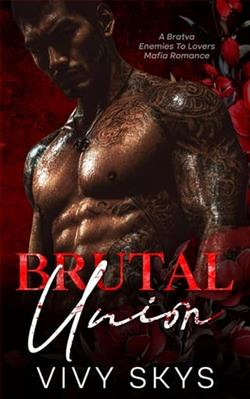Page 50 of Pity Play
Luke,
Look at this and then return it to my room when you’re done. I’ll put it away from there.
Mom
I’m interested enough in the contents of the book that I forgo making coffee. Instead, I pick up the album and take it to the family room.
After sitting on the couch, I open the cover. I feel a sharp pang in my heart when I see an image of a small boy. Based on the shape of his face and familiar lopsided grin, I assume it’s my father. The first few pages are pictures of him with a couple I’m guessing are his parents. No one is smiling, including my dad. The whole feel is like that oldAmerican Gothicpainting. Misery seems to be the main emotion.
Yet, in a couple of the pictures, my dad is playing with a boy a year or two older than him, and in those shots, he looks very happy. The resemblance between the two leads me to believe they’re brothers. My dad has never mentioned having any siblings, but the proof seems to be right in front of me.
It appears that my mom has decided the only way to get me and my dad back on track is to give me some information about his early years. So far, it doesn’t look like it was full of great memories.
Several pages in, the photographs stop, and the letters start.
The first one reads:
Dear Johnny,
I hate my new family so much. They don’t talk and laugh like we used to when Mom and Dad were alive. They just tell me what to do. Make your bed, Bob. Clean your room, Bob. Mow the lawn, Bob. It’s like they don’t even want to know me.
I hope things are going better for you. Remember, I love you and we’ll find some way to be together again someday. I promise.
Bobby
The notes from Bobby continue in the same vein for about a year. They’re all so sad, I can understand why my dad never wanted to talk about them. Turning another page, I find a memorial pamphlet from a church service. Opening it up, I discover a funeral card for Bobby.Oh my God, his brother died, too?This is beyond heart wrenching.
I finish looking through the album, but I don’t learn anything more about the people who raised my dad. All I discover is that he grew up in a small town in South Dakota. I’d always thought he was from Wisconsin, but how was I to think differently when he never told me anything?
Toward the end of the book, I find my dad’s high school diploma along with a card of congratulations. The inscriptionreads:
John,
Congratulations on your graduation. We wish you the best in life.
Your adoptive parents,
Joshua and Liv
Who wishes their child, adopted or not good luck on the rest of their life? It’s like they’re telling him they’re done with him and he’s on his own. It makes my blood run cold.
I continue to flip through the photo album and find a certificate that says my dad completed his associate’s degree in restaurant management. The degree came from a school in Milwaukee, which is where he met my mom. I have no idea how he came to leave South Dakota and move to Wisconsin. Although, I’m guessing his lack of a warm relationship with his adoptive parents had something to do with it.
I suddenly see why my mom said it was time for me to be an adult and treat my father like a child who needs to be shown the way. There must be a big part of his emotional growth that was stunted when he lost his parents and then his brother. The lack of nurturing he received from Joshua and Liv is sobering.
I think about how my whole life, my dad used to say, “Food heals.” He said this if we were sick, and he spoon-fed us homemade chicken noodle soup. He said this if we fell off our bikes and skinned a knee when he handed us a cookie. I always thought he meant that food was nourishing and good for us. I’m starting to think he meant it less literally. Like food heals your heart. That must be why he started cooking. He had a hole in his heart that he was trying to repair, and food brought him comfort.
My poor dad. A tear slides down my cheek as I think about how much he’s had to endure. I would never have imagined he started his life with such a significant deficit of care. I mean, Iknew things couldn’t have been great being that he never wanted to talk about his younger years, but still, nothing like this was ever on my radar.
Closing the book, I take it upstairs and leave it on my mom’s dresser. I take a minute to look around my parents’ bedroom. Every surface is covered with pictures of me and Kelsey. They range from the time we were babies and progress until very recently. Walking over to my
dad’s dresser, I spot a framed picture of me and my mom that was taken at the opening of Capon. Why would he display that if he’s so mad at me?
I’m left more confused than ever about my father’s attitude toward me. Yet at the same time, I feel a reservoir of determination build. I don’t know how, but I’m going to make things right between us once and for all.
I go back downstairs and put sheets on the hospital bed. Then I leave the house to grocery shop. I’m not going to make him my food, I’m going to make my dad the food he served to me when I was a child. Food that he wanted to “heal” me with.
In the baking aisle, I pick up a container of marshmallow fluff and laugh. I’m not a marshmallow fluff kind of guy, but my dad is. He used to eat the stuff right out of the jar. I put three containers into the cart before searching the store for the needed ingredients to make his chicken noodle soup. In the peanut butter aisle, I buy his favorite brand of extra chunky, and in the produce aisle, I add a bunch of bananas.















